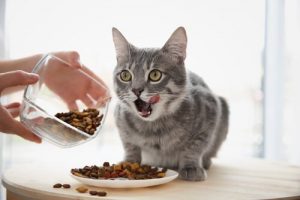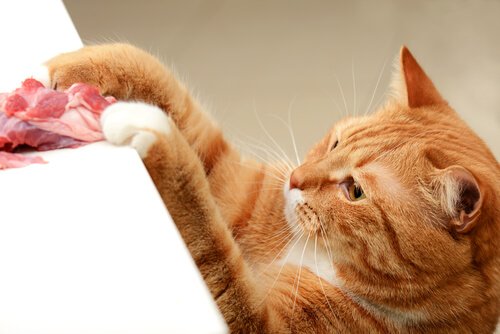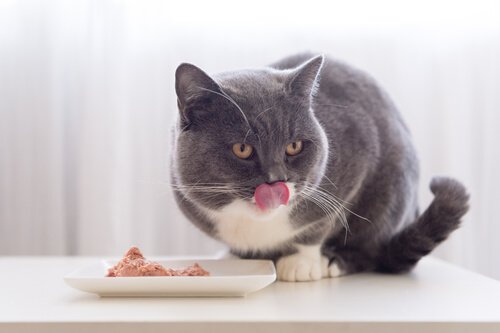Tips To Help Your Cat Eat Healthily


Written and verified by the lawyer Francisco María García
Cats are carnivorous animals by nature. Their diet “in the wild” is based mainly on hunting rodents and small birds, i.e. raw meat.
Normally, domestic cats don’t eat raw meat at home so that’s why it’s important to satisfy their nutritional needs in order to keep them healthy. That’s why it’s essential that your cat gets all the protein and fats they need.
Why do cats need so much animal protein?
The following are some of the benefits of animal protein:
- Help to form the structure of tendons, bones, ligaments, skin and nails
- It develops metabolic functions and those in the immune system
- Helps them gain muscle mass
It’s very important that you give your cat proper amounts of food and good quality protein. If the protein is bad, or they don’t get enough of it, a cat will lose his muscle mass.
Six practical tips to help your cat eat healthily
1. Meat based diet
Meat is the basis of any cat’s diet. An adult cat needs 25% of their daily diet to be protein, and that increases to 30% for pregnant cats and kittens. Their natural diet is also based on a high consumption of animal fat, which is their main source of energy.

It’s worth investing in high-end foods because they are nutritional. They contain a lot of protein and animal fat and contain few carbohydrates.
To make sure the food has the right proportions, check the nutrition label on the back of the package or at the store. Doing this will have an impact on the long-term health and well-being of your cat.
2. Feed them dry and moist food
It’s a good idea to feed your cat more dry food because it helps eliminate tartar from their teeth while they chew. This type of food can differ according to the cat’s age and level of physical activity. Especially because you won’t have to prepare it yourself.

In addition to dry food, you should add some wet food in their diet as well. Your cat will like this a lot more because it has an appetizing smell. This type of food is recommended because it contains 70% water, which helps them stay hydrated. This is very beneficial because cats usually don’t drink that the amount of water they should.
3. Make sure they always have water
The right amount of water keeps their kidneys working well. It also helps regulate their body temperature. To keep both functions running smoothly, you should always provide them with a full bowl of clean, cold water.
Lack of water in cats can cause serious health conditions, such as kidney damage and the formation of stones in their urinary tract. Also, they may become dehydrated.
4. Don’t feed them your leftovers
As we’ve seen, the nutritional needs of cats are very different to humans. Feeding them the wrong foods may cause intestinal obstruction, vomiting or diarrhea. It could also lead to obesity, a very common problem among cats.
5. Small portions of food
Cats tend to not eat all of the food that’s available to them. So, if the cat isn’t obese, or usually doesn’t eat all of his food at once, you can leave some food on their plate for later, when they get hungry.
Another option is to feed them at specific times to control their weight. The proper weight of a cat is shown through its ribs: they should be covered by a layer of fat and, at the same time, should be noticeable when touching them.
6. Control the formation of hairballs in their stomach
Cats tend to lick themselves as a way to clean themselves. That’s why it’s so common for them to swallow their hair that sticks to their tongue. Hairballs will form in their stomach and they get rid of them through vomit or bowel movements.
However, very large hairballs can cause a blockage in their intestinal tract. Cat owners can facilitate the excretion of these hairballs by feeding him a high fiber diet, brushing them on a daily basis, and taking them to a professional groomer for a haircut.
Cats are carnivorous animals by nature. Their diet “in the wild” is based mainly on hunting rodents and small birds, i.e. raw meat.
Normally, domestic cats don’t eat raw meat at home so that’s why it’s important to satisfy their nutritional needs in order to keep them healthy. That’s why it’s essential that your cat gets all the protein and fats they need.
Why do cats need so much animal protein?
The following are some of the benefits of animal protein:
- Help to form the structure of tendons, bones, ligaments, skin and nails
- It develops metabolic functions and those in the immune system
- Helps them gain muscle mass
It’s very important that you give your cat proper amounts of food and good quality protein. If the protein is bad, or they don’t get enough of it, a cat will lose his muscle mass.
Six practical tips to help your cat eat healthily
1. Meat based diet
Meat is the basis of any cat’s diet. An adult cat needs 25% of their daily diet to be protein, and that increases to 30% for pregnant cats and kittens. Their natural diet is also based on a high consumption of animal fat, which is their main source of energy.

It’s worth investing in high-end foods because they are nutritional. They contain a lot of protein and animal fat and contain few carbohydrates.
To make sure the food has the right proportions, check the nutrition label on the back of the package or at the store. Doing this will have an impact on the long-term health and well-being of your cat.
2. Feed them dry and moist food
It’s a good idea to feed your cat more dry food because it helps eliminate tartar from their teeth while they chew. This type of food can differ according to the cat’s age and level of physical activity. Especially because you won’t have to prepare it yourself.

In addition to dry food, you should add some wet food in their diet as well. Your cat will like this a lot more because it has an appetizing smell. This type of food is recommended because it contains 70% water, which helps them stay hydrated. This is very beneficial because cats usually don’t drink that the amount of water they should.
3. Make sure they always have water
The right amount of water keeps their kidneys working well. It also helps regulate their body temperature. To keep both functions running smoothly, you should always provide them with a full bowl of clean, cold water.
Lack of water in cats can cause serious health conditions, such as kidney damage and the formation of stones in their urinary tract. Also, they may become dehydrated.
4. Don’t feed them your leftovers
As we’ve seen, the nutritional needs of cats are very different to humans. Feeding them the wrong foods may cause intestinal obstruction, vomiting or diarrhea. It could also lead to obesity, a very common problem among cats.
5. Small portions of food
Cats tend to not eat all of the food that’s available to them. So, if the cat isn’t obese, or usually doesn’t eat all of his food at once, you can leave some food on their plate for later, when they get hungry.
Another option is to feed them at specific times to control their weight. The proper weight of a cat is shown through its ribs: they should be covered by a layer of fat and, at the same time, should be noticeable when touching them.
6. Control the formation of hairballs in their stomach
Cats tend to lick themselves as a way to clean themselves. That’s why it’s so common for them to swallow their hair that sticks to their tongue. Hairballs will form in their stomach and they get rid of them through vomit or bowel movements.
However, very large hairballs can cause a blockage in their intestinal tract. Cat owners can facilitate the excretion of these hairballs by feeding him a high fiber diet, brushing them on a daily basis, and taking them to a professional groomer for a haircut.
This text is provided for informational purposes only and does not replace consultation with a professional. If in doubt, consult your specialist.








